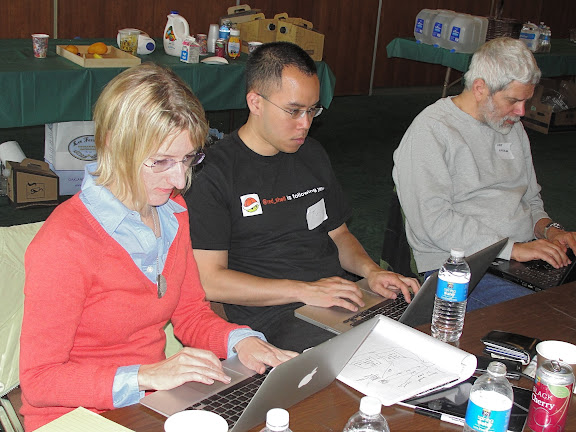By Howard Dyckoff
The idea is simple: our lives are enmeshed in digital information and technology. We use mobile phones and computers every day and the arcs of our lives are recorded in the vertical silos of government data banks and the private silos of Facebook, Google, Twitter and other online service providers.

Why not create applications to solve real problems, right here here in East Oakland?
That’s what community activists and tech heads will be doing this Saturday at Code For Oakland’s Hang Out and Hackathon. And this year there will be discussion of how to keep the joint community and techie effort ongoing.
Attendance is basically free for community members and those who work for nonprofits. Developers are only requested to make a small donation of $1 to $20 to help cover costs. Lunch is provided with lots of caffeine to get the coding done. And there will be prizes – rumor has it, $5000 worth.
The action starts at 8:30 Saturday morning in the Kaiser Center at 300 Lakeside Drive, facing Lake Merritt. This is a comfortable space with sweeping views of the lake and a beautiful rooftop garden.
Learn more about this weekend’s Code For Oakland event by clicking here. You can click here to register. The event’s hashtag is #codeforoakland.
Developers will all be tackling this one essential question: what kind of cell phone-based application would make East Oakland a better place to live and work and play?
The organizers and sponsors of Saturday’s event are part of the emerging Open Data Movement which tries to create access to public data held by city, state and federal governments and also foundations and community groups. These data can be used to find things and visualize what is happening in our neighborhoods.
There are data collections on which stores take food stamps, on income levels by neighborhood and census tract, on bus and BART schedules, on crime, on drug use, on HIV incidence. Data miners are also interested in information about foreclosures, voting patterns and political contributions.
Pressure from the Open Data Movement is helping to make those figures open to the public, and soon we will all be able to search and visualize the numbers – information that belongs rightfully to the public. Oaklanders can now begin to envision ways to combine and mashup that open data and make all of our lives better and help to build a better Oakland.
Bay Area News Group reporter Angela Woodall is imagining a phone app that finds fresh food outlets in East Oakland, lists which ones take food stamps or an EBT card, and also allows users to rate the locations listed.
Click here for a list of data sets now available to all of us. What can you imagine doing with these?
If you have an idea for a small mobile phone or web application that could make your life better or your community better, then please consider coming down and sharing it with everyone.
You might find a team of developers who will make your idea a working reality!

The Code for Oakland organizers say this weekend’s hackathon is focused on “building apps, hacking public data and building tools to support economic development in Oakland, improve civic engagement, improve digital education and literacy in our residents and provide tools to attract and sustain local business in the town.”
At Code For Oakland’s debut event last year, $10,000 in prizes and federal sponsorship were awarded for the best applications.
Almost 100 developers and community members toiled together all day to build several applications. The winning mobile app, Txt2work, was designed to help people reenter their communities and search and apply for jobs via their feature phone.
A second app, BettaStop (@BettaSTOP), used text messaging to post comments on the quality of bus rides on AC Transit in Oakland. OakWatch was a mobile/web project to allow real time neighborhood reporting via mobile systems.
Come on down and help bring The Town even further into the Digital Age.
Howard Dyckoff has lived in Oakland for over 40 years and has been involved with many community groups, including Oakland Digital and Oakland Local, Block by Block, the East Oakland Boxing Association (EOBA), and CBE. A Brooklyn, New York, transplant, and an Aerospace Engineering graduate of NY Polytechnic, Howard also attended Laney College, where he wrote for the Laney Tower newspaper and was elected editor. Howard also attended the Starr King School at the Theological Union in Berkeley.
He has served as the Berkeley Free Clinic’s Outreach Coordinator, and also worked as an information technology professional at Chevron, Sybase, and Wells Fargo. He worked in both the 2010 and 2020 Census. Howard has been a regular contributor to Oakland Local and online publications such as TechTarget and Linux Gazette and currently writes for Oakland Voices. He currently does event photography and portraiture around the Bay Area.

Code for Oakland is a great event. I enjoyed last year’s, and was impressed with the ideas and coding that people came up with. Angela’s idea for East Oakland is similar to Susan Mernit’s idea that I worked on with a group, the Oakland Food Finder. Though we also envisioned including farmers markets, school food markets, and various community gardens.
(Not sure who that geeky guy in the blue Habitat sweatshirt is, though 🙂
Thanks for posting this Howard! Your photos and story bring back some of the fun times from that day.